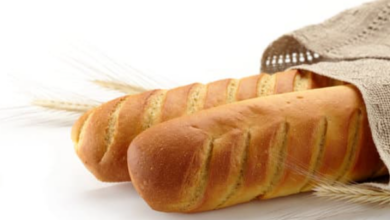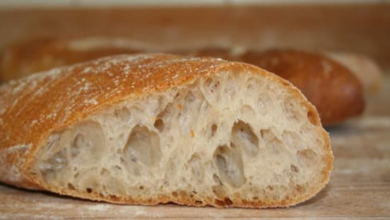Baguette Vs. Sourdough: Which Bread Is Better?

What To Know
- Prepare to embark on a culinary journey as we uncover the nuances that set baguette and sourdough apart, revealing their individual charms and the reasons why they continue to reign supreme in the bread kingdom.
- The process begins with creating a sourdough starter, a mixture of flour and water that is fermented by wild yeast and bacteria.
- Sourdough bread, on the other hand, has a denser and more substantial texture, with a chewy crust and a moist crumb.
In the realm of bread, two titans stand tall, each with a unique story to tell. Baguette and sourdough, both hailing from different origins and boasting distinct characteristics, have captured the hearts and taste buds of bread enthusiasts worldwide. This blog post delves into the captivating world of these two iconic breads, exploring their history, flavor profiles, textures, and the art of crafting each one. Prepare to embark on a culinary journey as we uncover the nuances that set baguette and sourdough apart, revealing their individual charms and the reasons why they continue to reign supreme in the bread kingdom.
A Journey Through Time: The History of Baguette and Sourdough
Baguette: A French Icon
The baguette, with its elongated shape and crisp crust, has become synonymous with French cuisine. Its origins can be traced back to the 19th century, when bakers in Paris began experimenting with new bread-making techniques. The result was a long, thin loaf with a distinctive crust that quickly gained popularity among Parisians. Today, the baguette is a symbol of French culture, often served alongside cheese, wine, and other delicacies.
Sourdough: A Timeless Tradition
Sourdough bread, with its tangy flavor and dense texture, has a history that spans millennia. Its roots can be traced back to ancient Egypt, where it was made using a mixture of flour and water that was fermented by wild yeast and bacteria. Over time, sourdough spread throughout Europe and beyond, becoming a staple food in many cultures. Today, sourdough bread is prized for its unique flavor and health benefits, making it a favorite among bread connoisseurs.
The Art of Crafting Baguette and Sourdough
Baguette: A Symphony of Simplicity
Creating a baguette requires precision and skill. The dough is typically made from a combination of flour, water, salt, and yeast. The dough is then kneaded and folded repeatedly to develop its gluten structure, which gives the baguette its characteristic chewy texture. After proofing, the dough is shaped into long, thin loaves and baked in a hot oven until the crust is golden brown.
Sourdough: A Labor of Love
Sourdough bread is a testament to the patience and dedication of bakers. The process begins with creating a sourdough starter, a mixture of flour and water that is fermented by wild yeast and bacteria. This starter is then used to leaven the dough, which is typically made from a combination of flour, water, salt, and sometimes additional ingredients like seeds or nuts. The dough is then fermented for an extended period, allowing the sourdough culture to develop its signature tangy flavor. Finally, the dough is shaped and baked, resulting in a dense, flavorful loaf.
Baguette vs Sourdough: A Comparison of Characteristics
Flavor Profile: A Tale of Two Tastes
Baguette is renowned for its mild, slightly sweet flavor that pairs well with a variety of toppings. Its crust is often crispy, while the crumb is soft and chewy. Sourdough bread, on the other hand, has a more complex flavor profile, with a distinct tanginess that comes from the sourdough culture. Its crust is often harder than that of a baguette, and the crumb is denser and more moist.
Texture: A Matter of Chewiness
The texture of baguette and sourdough is a key distinguishing factor. Baguette has a light and airy texture, with a crispy crust and a chewy crumb. Sourdough bread, on the other hand, has a denser and more substantial texture, with a chewy crust and a moist crumb.
Versatility: A Bread for All Occasions
Baguette is a versatile bread that can be enjoyed in a variety of ways. It is often served as a side dish with meals, used to make sandwiches, or sliced and toasted for breakfast. Sourdough bread is also versatile, but its denser texture makes it particularly well-suited for toasting and making sandwiches.
Which Bread Reigns Supreme?
The choice between baguette and sourdough ultimately depends on personal preference. Baguette is a classic choice for those who enjoy a light and airy bread with a mild flavor. Sourdough bread is a great option for those who prefer a more complex flavor and a denser texture.
Beyond the Basics: Variations and Innovations
Baguette: A Canvas for Creativity
Bakers have experimented with various ways to enhance the flavor and texture of baguette. Some popular variations include adding different types of flour, such as whole wheat or rye, or incorporating seeds, nuts, or herbs into the dough.
Sourdough: A Bread of Endless Possibilities
The world of sourdough bread is vast and ever-evolving. Bakers have created countless variations using different types of flour, sourdough starters, and fermentation techniques. Some popular variations include sourdough bread made with whole wheat flour, rye flour, or even ancient grains like einkorn or spelt.
The Health Factor: A Comparison of Nutritional Value
Baguette: A Source of Simple Carbohydrates
Baguette is a good source of carbohydrates, which provide the body with energy. However, it is important to note that baguette is made from refined flour, which is lower in nutrients than whole wheat flour.
Sourdough: A Healthier Choice
Sourdough bread is generally considered to be a healthier choice than baguette. It is made with whole wheat flour, which is higher in fiber and nutrients. Additionally, the fermentation process in sourdough bread produces lactic acid, which may have probiotic benefits for gut health.
The Verdict: A Matter of Taste and Occasion
Baguette and sourdough are both delicious and versatile breads with unique characteristics. The choice between the two ultimately depends on personal preference and the occasion. For a light and airy bread with a mild flavor, baguette is a great choice. For a more complex flavor and a denser texture, sourdough bread is the way to go.
Frequently Asked Questions:
Q: Which bread is better for sandwiches?
A: Both baguette and sourdough bread can be used for sandwiches, but sourdough bread’s denser texture makes it a better choice for heartier sandwiches with multiple fillings.
Q: Can I make baguette and sourdough bread at home?
A: Yes, it is possible to make both baguette and sourdough bread at home. However, it is important to note that these breads require time and patience to make.
Q: Which bread is better for people with gluten sensitivity?
A: Sourdough bread is generally considered to be a better choice for people with gluten sensitivity, as the fermentation process may help to break down the gluten proteins. However, it is important to note that sourdough bread is not gluten-free and may still cause a reaction in some people with gluten sensitivity.





